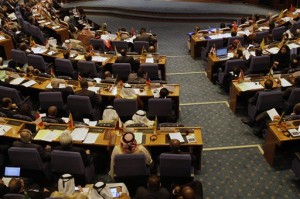
A ministers meeting of the Non-Aligned Movement, NAM, takes place in Tehran, Iran, Tuesday. Iran is currently hosting a weeklong gathering of the 51-year-old movement, which ends Friday. PHOTO/AP
MANILA, Philippines – Vice President Jejomar Binay on Friday urged member-states of the Non-Aligned Movement (NAM) to engage more in international dialogue, saying this would bridge the gaps in international relations among nations.
“Working together as one human family, there is no limit to what we can do to close the gaps arising from so much inequality, injustice, and conflict within, and between, nation-states,” Binay said in a speech he gave during the movement’s 16th summit held in Tehran, Iran.
Binay flew to Iran as the representative of President Benigno Aquino III to the two-day summit attended by representatives of all 120 NAM member-states as well as 29 associated observer countries and organizations. United Nations Secretary General Ban Ki-moon and General Assembly President Nassir Abdulaziz Al-Nasser are also expected to attend the event.
In his speech, Binay used as an example host country Iran’s initiative at the United Nations (UN) during the UN General Assembly to proclaim 2001 as the Year of Dialogue Among Civilizations – a move he described as “historic.”
“Since then universities and think tanks have taken up that project, and a group of distinguished international citizens, scientists and intellectuals meet yearly on the Greek island of Rhodes to pursue the dialogue,” he said.
Binay, also stressed the Philippines’ stand on peaceful resolution of territorial disputes, saying that countries’ should support peaceful settlement mechanisms.
“We faithfully adhere to the charter of the United Nations, the UN Convention on the Law of the Sea, and the 1982 Manila Declaration on the peaceful settlement of disputes in all our actions related to our territorial dispute with some of our Asian neighbors,” Binay said.
“It is our hope that in this conference, we could all reaffirm our commitment to peace by rejecting any action that detracts from the peaceful settlement of any dispute,” he added.
The West Philippine Sea (South China Sea), the site of vast oil and gas resources, has been the subject of tensions in recent months because of countries’ completing claims to the area.
China, Philippines, Brunei, Vietnam, Malaysia and Taiwan claim all or parts of the area.
The Philippines had been pushing for peaceful resolutions of disputes under international law, specifically the United Nations Convention on the Law of the Sea (Unclos).
China, on the other hand, had been maintaining the position that disputes among countries should be discussed in a bilateral and not multilateral approach.